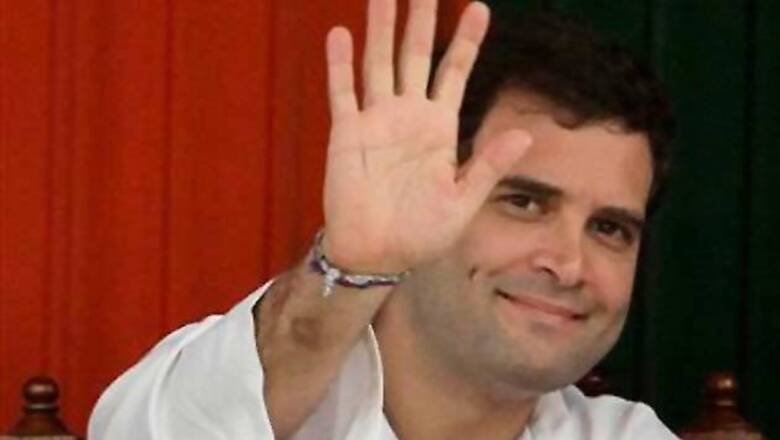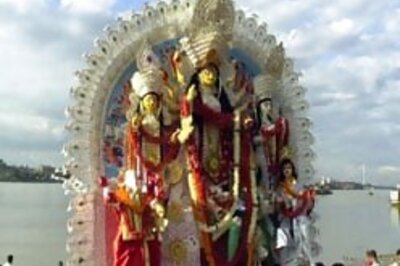
views
With Manmohan Singh announcing his decision to relinquish prime ministership at the end of his second five year term, the debate on who will be the prime ministerial candidate of the Congress party and UPA in the 2014 Lok Sabha elections has gained added significance. The Prime Minster himself indicated that the Vice President of his party, Rahul Gandhi, had the right credentials to lead the party and if the situation so arose, a Congress led government.
With the rival BJP having declared its prime ministerial candidate, it is imperative for the Congress to announce its prime ministerial candidate. Congress President Sonia Gandhi did assure the people that such an announcement would soon be made, when responding to presspersons soon after the December state assembly election results were announced.
What prevents the Congress party from declaring Rahul Gandhi as the Congress prime ministerial candidate? Are party strategists unsure of whether it would adversely impact on the political future of their Vice President? More importantly, is the Congress having to confront a 'reluctant' leader?
Many saw the UPA victory in the 2009 Lok Sabha elections as the appropriate moment for Rahul Gandhi's anointment as prime minister 'under training'.
Manmohan Singh's invitation to him to join the Cabinet was a clear indicator of this fact. Rahul Gandhi preferred to decline the invitation as he claimed he wished to build the party.
As General Secretary in charge of the youth wing, Rahul Gandhi created his close circle of confidants who were in sync with his ideas and approach. The Uttar Pradesh elections saw, Rahul Gandhi launching a vigorous ground level campaign.
When the results came trickling in, he was honest to concede that the 'connect' with people was not fully established. As a Member of Parliament, one saw him in the House on some occasions and heard him articulate his views on select subjects. During the last five years, three trends were clearly discernible.
First, there was tremendous hope and enthusiasm among the party rank and file who saw in Rahul Gandhi a youth leader from the 'Nehru-Gandhi' dynasty who could unit the party and provide it with a 'charismatic' face. The comparison with his father, Rajiv Gandhi was frequently made. The positive spin however, stops here.
The other two indicators were patently negative. While Rahul Gandhi raised issues both on the floor of the Lok Sabha and in the public domain, there was little consistency in his performance. More often than not it was a 'switch on - switch off' approach. He would suddenly make a strong statement on a matter of public importance which had generated a serious debate and then not be seen or heard for long periods.
This was true on a range of issues, be it the Lokpal bill, floods in Uttarakhand, price rise and the like. Finally, more often than not, whenever he appeared and spoke on a public platform, the high energy, transparent sincerity and natural enthusiasm (which were the hall mark of Rajiv Gandhi's style) were clearly missing. It frequently appeared that he was 'going through the motions' and his 'heart' was not in what he was doing.
Further, his campaign organisers, image managers, and political strategists did not 'package' the leader appropriately. This was clearly evident in the Uttar Pradesh Assembly elections campaign, which was a 'high-stakes' election for Rahul Gandhi. He often sounded and appeared condescending and less than 'fully convinced' about many of the statements he made. Here lies the true challenge that Rahul Gandhi faces in the leadership stakes.
It must be conceded that in the different rounds of the Tracker Poll and Post Poll (in the states that had elections in November-December 2013), there was support for Rahul Gandhi across the nation. This often appeared limited, largely on account of the reasons cited above.
A detailed analysis of the two recent occasions when Rahul Gandhi made 'headlines' by going against the line toed by the party/ government merit detailed scrutiny.
On both these occasions, the party spokespersons and important leaders in government had to make a calibrated attempt to defend Rahul Gandhi and explain the logic and rationale of his sudden outbursts.
His debunking of the government/ party stand on the proposed ordinance to shield convicted politicians who held elected positions, did not sound too convincing on account of the 'switch on-switch off' approach that has become his trade-mark. So do his criticism of the Maharashtra Cabinet for rejecting the Adarsh Report.
For the public, on both occasions, it was a sudden rush of 'energy' which neither had a planned build up nor a sustained momentum.
The recent move to bring in Priyanka Gandhi is yet another indicator of the inability of Rahul Gandhi to claim the leadership 'space' which awaits him. In that sense he appears like a reluctant 'crown prince', not keen to accept the challenges and responsibilities of an important leadership role.
The Congress is clearly in search of a credible leader who can be presented as the 'visible face' of the party and can take on the opposition. For many Rahul Gandhi has the potential.
In the last fives years he appears to have let go of several opportunities to seize the initiative and categorically demonstrate his capacity and more importantly, willingness to lead his party.
(Sandeep Shastri is the National Coordinator, Lokniti Network and Pro Vice Chancellor, Jain University)



















Comments
0 comment